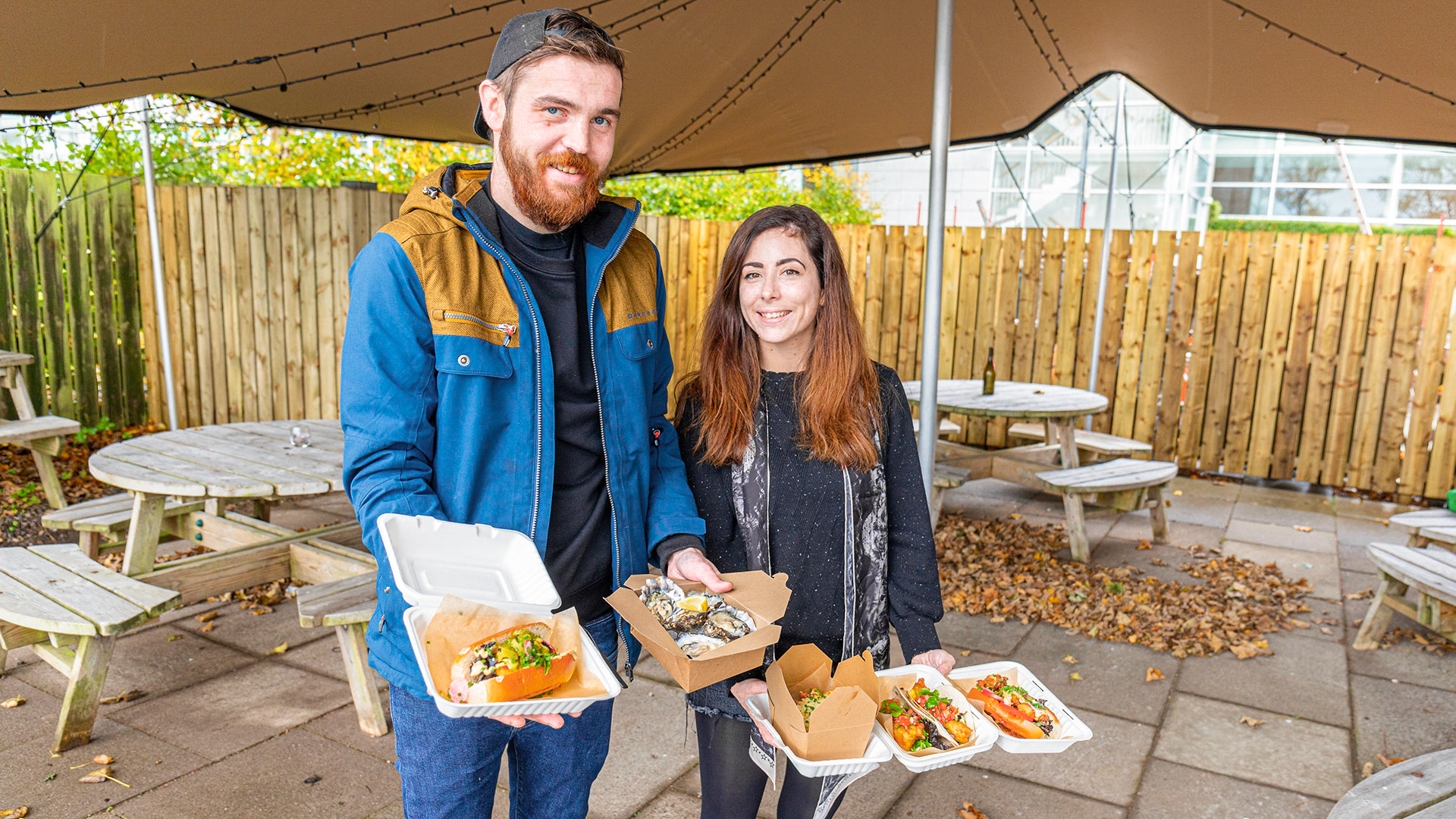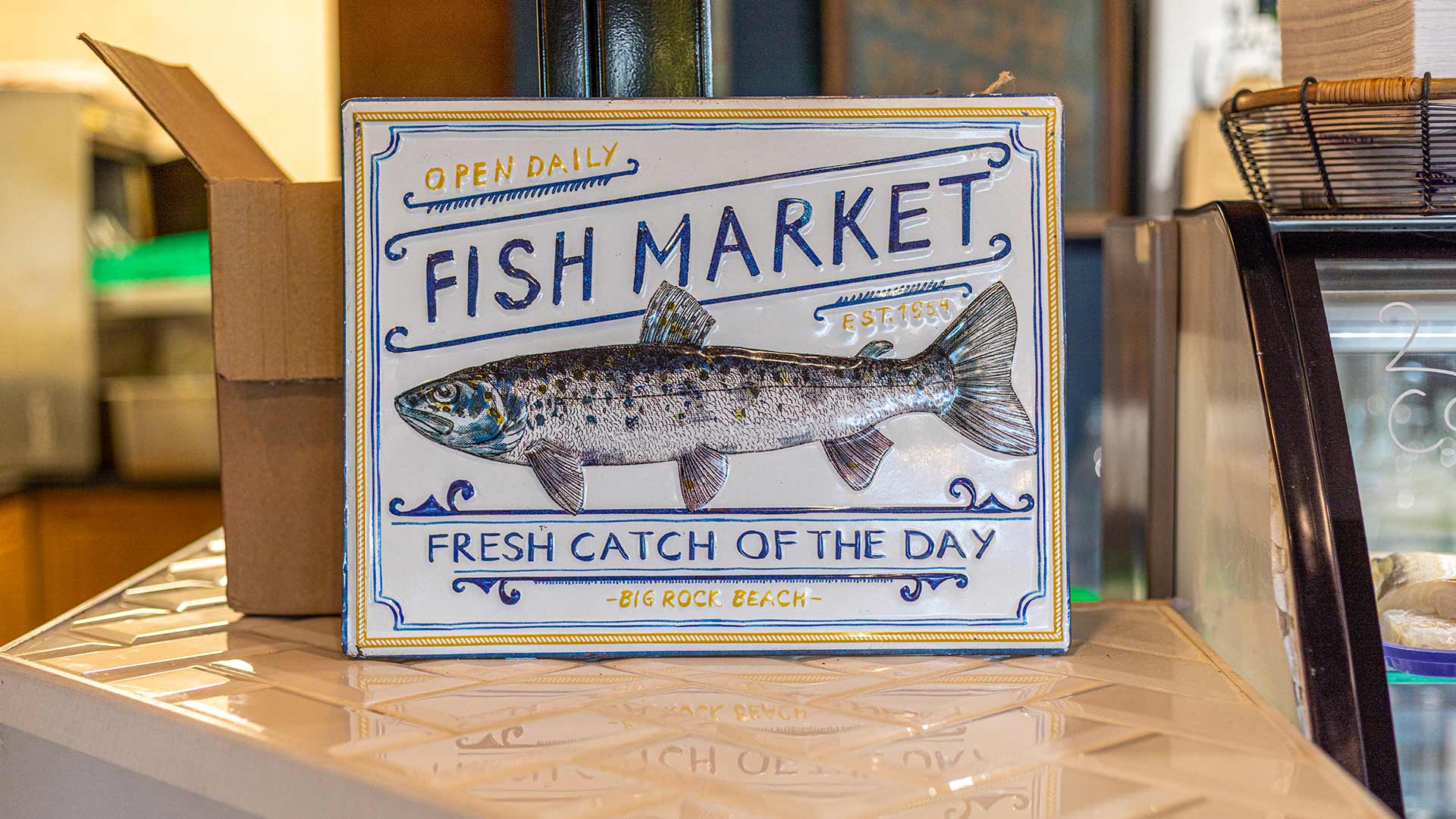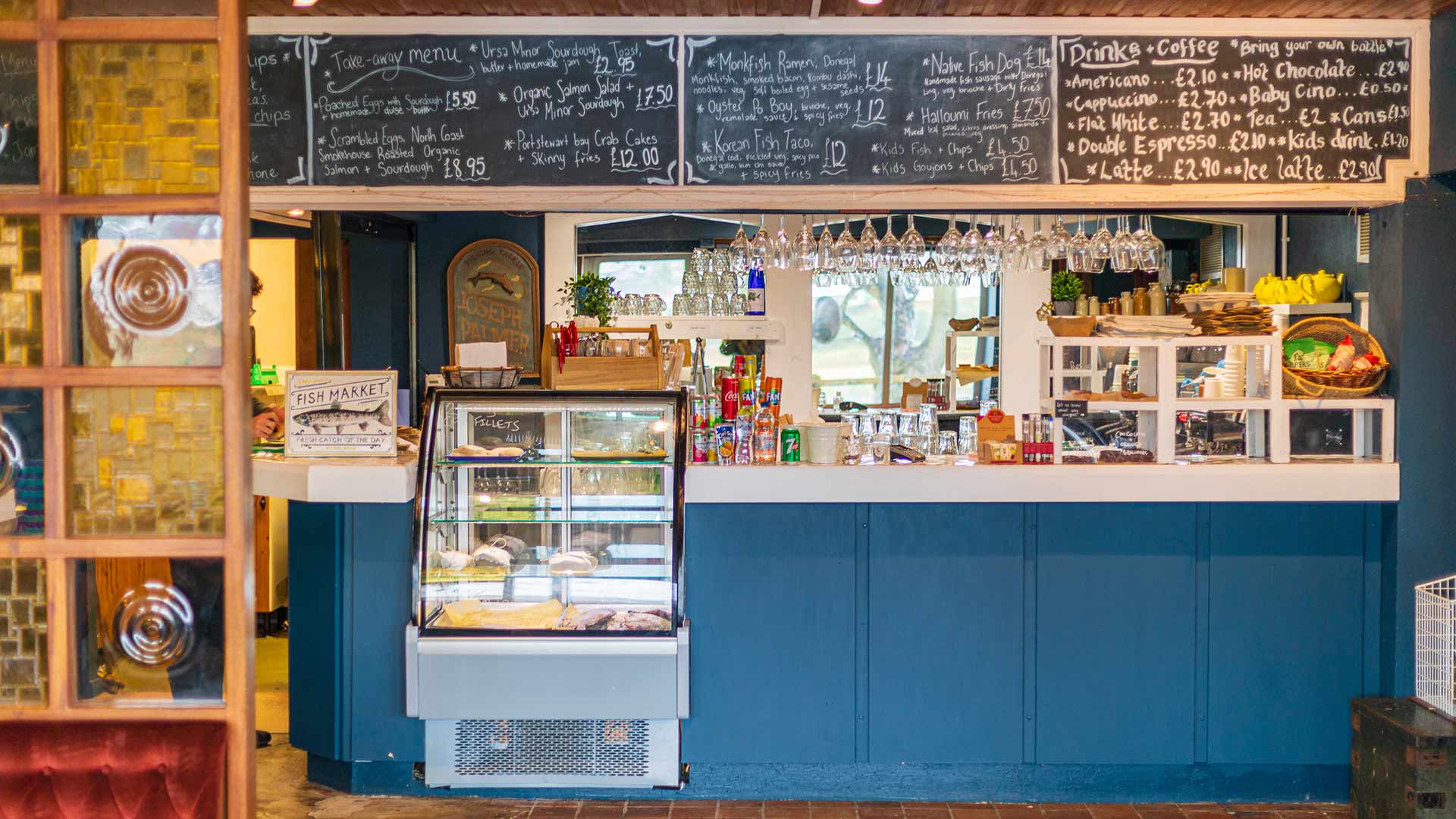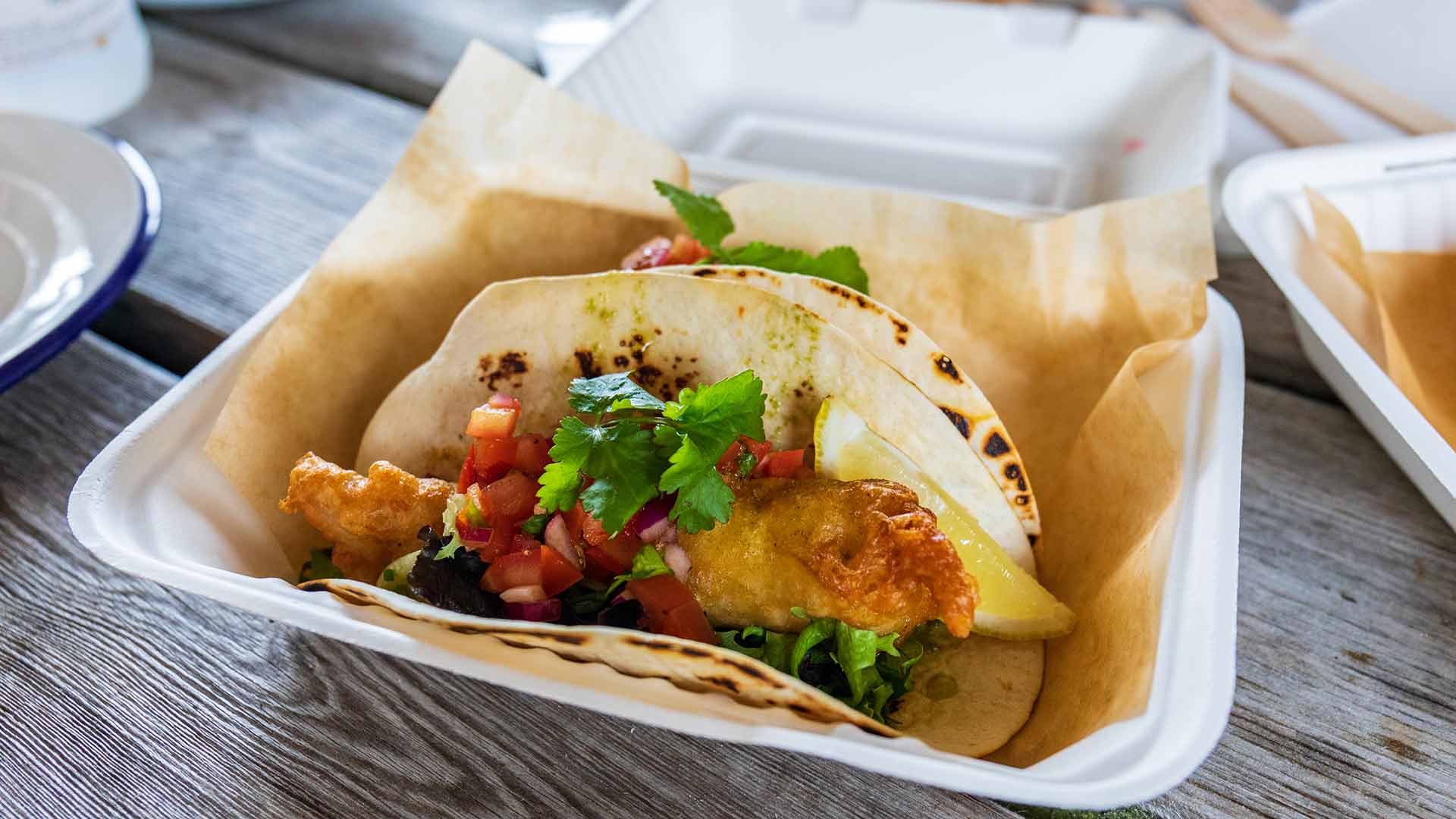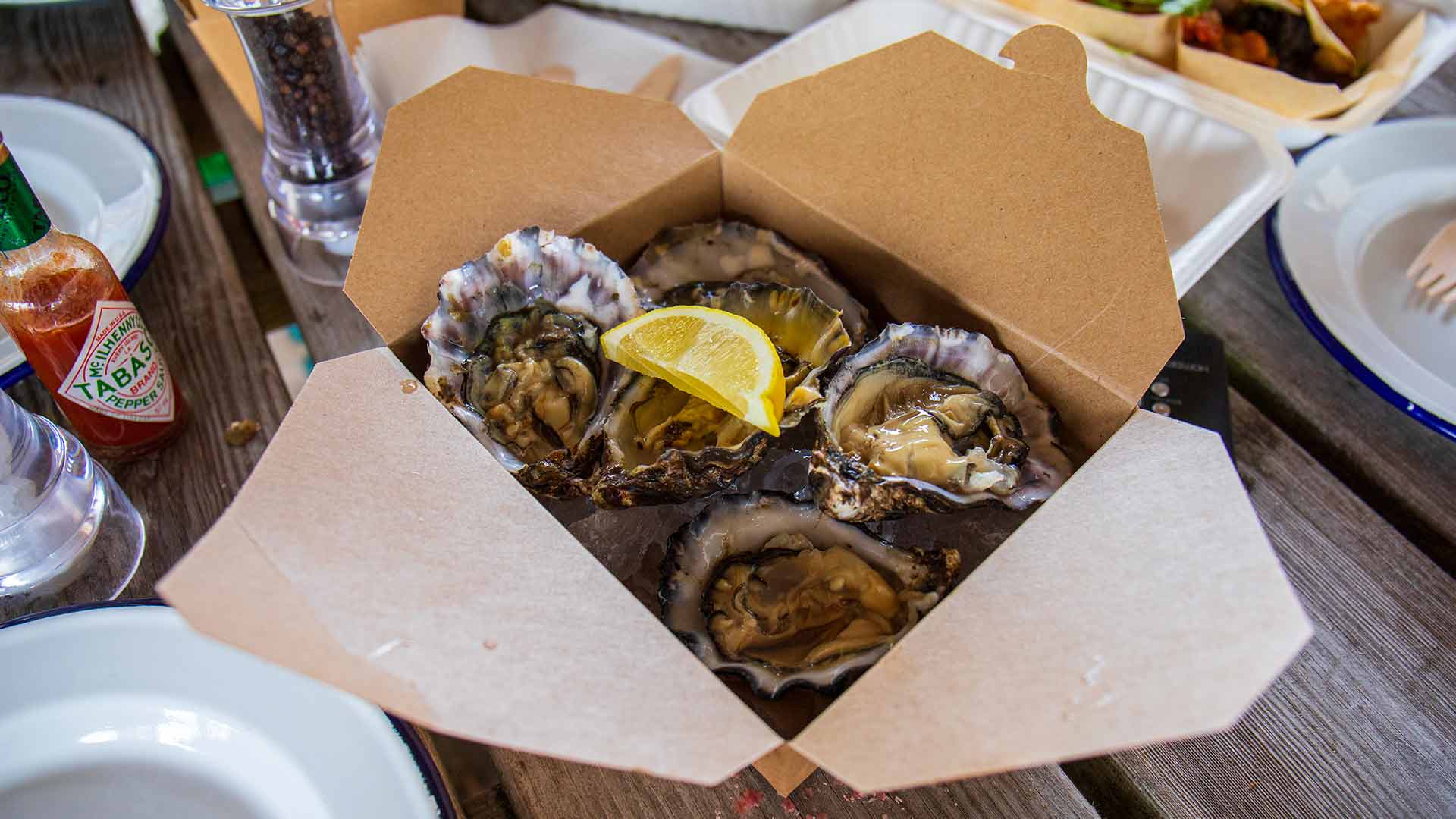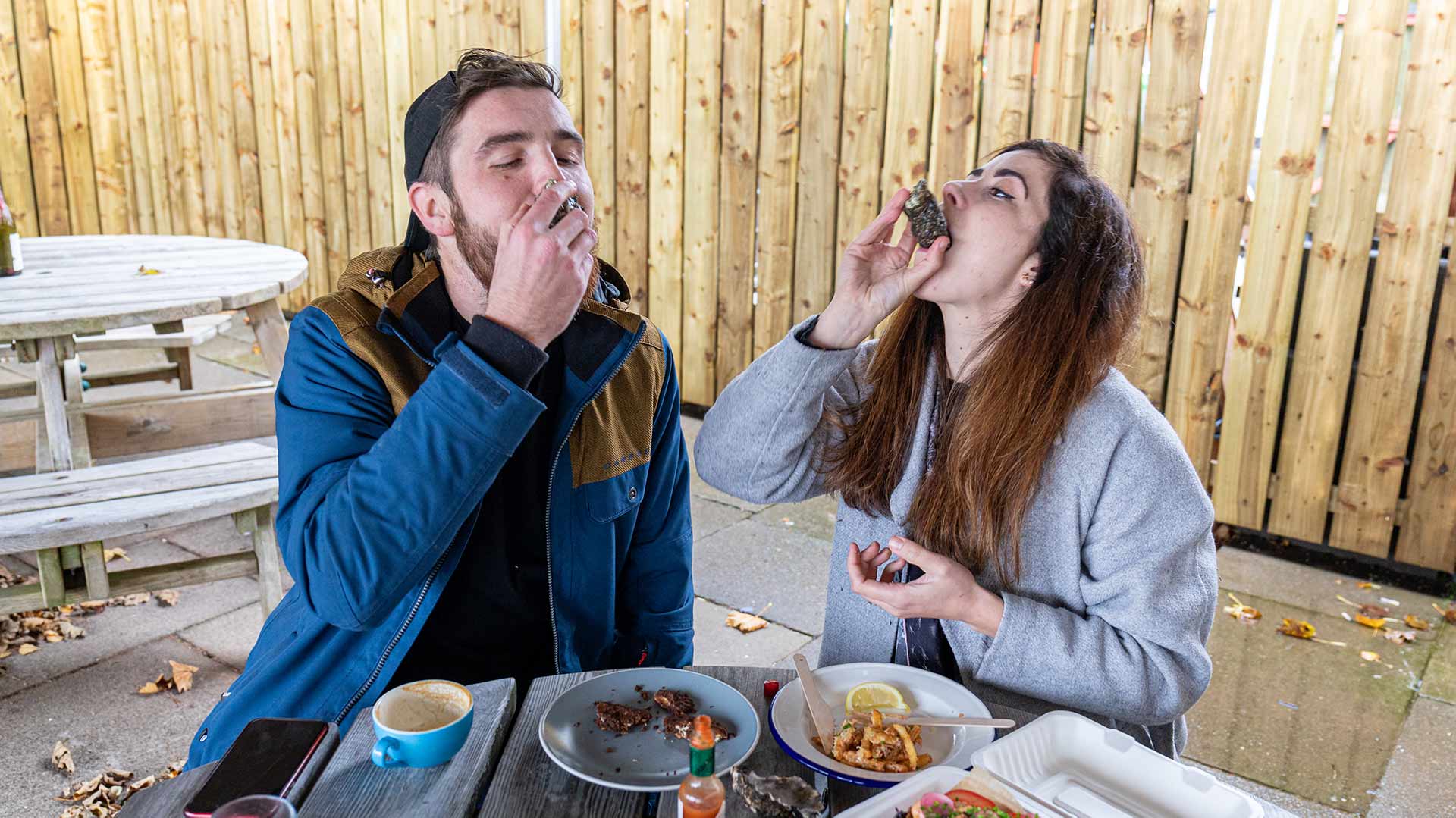“Do we want to eat without fear, tearing into the local stew, the humble taqueria’s mystery meat, the sincerely offered gift of a lightly grilled fish head? I know what I want. I want it all. I want to try everything once.”
Anthony Bourdain
“Why is it so difficult to find great seafood?”
This is the number one question posed by everyone we have spoken to on our journey across Northern Ireland.
Rebekah and Stevie McCarry aren’t asking that question – they’re answering it. With some of the best fishing reserves in the world, they are heading up the North Coast’s newest seafood restaurant and fishmongers on the banks of the Bann. ‘Native’ doesn’t even begin to describe how local ‘thon scran’ is. Their fish is so parochial it’s become an ‘ecumenical matter’.
Opening up a lobster and oyster joint in Coleraine, in the middle of a pandemic, would seem like a recipe for disaster. Luckily, these two ‘entrepreneurial giants’ have successfully traversed the many ‘causeways’ of the Ulster palate and are restoring Northern Ireland’s world-renowned seafood to its rightful place – in the bellies of local people.
Don’t take it from us – this is what they had to say:
How did you get your start in hospitality?
[Stevie] I’ve been a salesman and a car mechanic – I’ve been just about everything you can think of. A few years back, I knew it was time for a change.
I started getting into cooking and dropped into Harry’s Shack and was like, “Listen, I don’t know what I’m doing, but I’m keen.”
So I worked there for a while, learning all I can. My wife, Rebekah, was like, “Go for it – do what you love!” Her support was unwavering, even after just giving birth.
In truth, it was a pretty shit midlife crisis. Instead of getting a convertible, I was working 14 hours a day cooking fish.
I worked my way up a few different places, but everywhere was doing the same thing. You know when you go somewhere and there’s a framed menu with cobwebs on it? That’s a feature in some restaurants around these parts. No one was willing to go out on a limb and try something different and that pissed me off.
Eventually I hit a breaking point, “If youse aren’t gonna do it, we will!”
[Rebekah] I grew up in hospitality and vowed never to return after experiencing the long hours and corrupt ways of the industry, but here we are! I can’t keep away from the buzz of service – there’s nothing like it! The time I spent away from hospitality was spent studying a degree and working in marketing. I guess this didn’t fully go to waste as we knew we would have to adapt the traditional concept of a fishmongers. From the beginning, our fish sales were totally reliant on online marketing through social media.
[Stevie] The thing about service is, you feel like you’re going to war every day, and that’s a magical feeling. The movie Inglourious Basterds comes to mind – that’s most kitchens. Anthony Bourdain had it right, kitchen folk are bonkers. The drugs, the long hours, the isolation – you have to be mad! You know it’s bad when 100 hours in the kitchen is something chefs are proud of. The comradery is simply unmatched.
[Rebekah] We were lucky. Our skills collided and this place was built upon that foundation.
What was it like starting a business in the middle of a pandemic?
We began renting this place right before the pandemic – you can say that our ‘flawless’ plans have been slightly altered by this year’s events. It’s been rough, but we’ve adapted to everything that has been thrown our way.
[Stevie] I was a temp chef at another restaurant before we got started, so I wasn’t eligible for furlough. The weeks were rolling by and we noticed we started eating more stuff out of a can.
[Rebekah] We had only just got the lease for the premises and had no income and two kids to look after.
We had all our local fish suppliers lined up for opening, but we weren’t able to do a proper welcoming event. Peter Boston, our lobster man, kept encouraging us to do something else in the meantime.
We thought to ourselves, “You can’t get your hands on lobsters right now.” So that week, we bought 24 lobsters and sold them within an hour – we couldn’t believe it!
[Stevie] 85% of the people that bought them didn’t know we sold them alive and had never cooked them before. So that brought about some amazing conversations that really embedded us in the local community from the ‘get-go’.
How did it grow from there?
We then started delivering lobsters and the demand grew and grew. We thought, if people are coming for lobster, they’ll want fish as well. We went down to Greencastle for the first time and bought £1000 worth of fish. Rebekah hopped on social media and people started flooding in.
She put out a message like, “Don’t you find it weird we live on the North Coast and you can’t find good fish anywhere?” The response was palpable.
It’s a great question – I can’t even answer it and I’m a chef!
[Rebekah] We gradually started letting guests into the restaurant, once it was permitted, for dine in and takeaway, and started serving coffee and buns supplied by Vittle Bakeshop.
[Stevie] At the height of it, we’ve been taking in about 210 lbs of lobster a week.
You are fishmongers too?
[Rebekah] Beyond the restaurant and takeaway, we’re selling all sorts of fish for people to cook at home. We want fish to be an embedded part of our local culture, as it always should have been. People come into our fish market and it’s a chance to have a conversation, which, more often than not, leads to them trying things they may not have previously.
[Stevie] I spend 30% of my time chatting with people about fish and walking them through how they might go about their preparation at home.
Before we started, there was no one in Coleraine doing fish, which is a shame because our access to seafood is endless here. I think a large part of why restaurants have avoided fish is because it takes immense attention to detail. You can overcook a burger and some godforsaken soul will still enjoy it.
When you’re cooking fish, you can’t just fire it into the pan and hope for the best.
What’s the local seafood supply chain like?
Fish has traditionally featured as a special at restaurants around here, which gave it the reputation of being expensive. This put people off fish and it’s the wrong approach. Fish has so many positive health effects. Fish shouldn’t be a ‘treat’, it should be a staple and it should be affordable.
Restaurants are so predictable – it’s always a salmon fillet or sea bass special. Answer me this – if ‘wild’ salmon and sea bass can’t be fished commercially, how are they featured as ‘specials’ daily? And how is it that sea bass fillets fit just about every plate in every restaurant perfectly. Fish doesn’t grow like that in the wild – that happens in a cage.
There are delicious, wild products all around us and local fishermen are catching them. The issue is that the wider industry doesn’t want to go through the hassle of doing things correctly, even though factory farm fishing is, in many circumstances, creating more work and shitter products.
Is ‘trace-ability’ important?
If you go to a butcher’s and get a sirloin, the butcher can tell you where the steak came from, who the farmer is and how it was raised. That ‘trace-ability’ is beautiful.
In Native, we have that with our fishermen. People love that and it elevates what we do. Most of our fish is found between here and Donegal and it’s cooked or sold in the first two days it was caught.
Is education a part of what you do?
[Rebekah] We did an ‘Under the Sea’ event at our daughter’s school. The kids ate it up; they loved holding the lobsters. Education is crucial.
[Stevie] The sooner kids are hands-on with fish, the better. Captain Bird’s Eye isn’t a fisherman; Ronald McDonald isn’t a clown. These are commercially constructed ideas that distance us from reality and from learning tangible skills. People need to know where their food comes from and, if we can peak their interests from an early age, it can only elevate our local industry moving forward.
On the education system…
[Rebekah] Health isn’t a thing in any education almost anywhere, it seems. Isn’t it the most important thing? Shouldn’t nutrition be an integral part of learning?
[Stevie] People are passing their picky habits onto their kids, which is tragic. Our kids eat everything; they’re grateful. It’s a part of confidence-building. People should feel confident in the kitchen and at the dining table.
Are you planning further renovations?
[Rebekah] We were planning to ‘hipsterfy’ the place, but, looking back, it’s all unnecessary things we don’t need. We will put a deck in because, how can we not, being here on the Bann. We’ll have more outside space with a bar, but, besides that, we’ll keep it simple.
You’re right next to the Council buildings, you must get loads of clientele from there?
[Stevie] You’d think so, but we don’t. They’re adverse to us – and to good ideas – in general.
They should be investing in the waterfront and pedestrianizing it, making it easy for shops and food stands to set up and make something of this place. But, of course, they don’t. Some people are afraid of competition, but we want competitors – I’d love to have 10 competitors up and down this river. We need places to go on our day off, too!
Thankfully for us, our support is from the local community. We have so much backing that those bureaucrats will have to start to listen, eventually. The people that come through our doors are ultimately the ones putting them in the positions they’re in.
On the North Coast and its food scene…
[Rebekah] Why is the North Coast not looked at in the same way as the Westend of Galway, or Kerry, or Cork City? We have everything you’d ever need here in terms of tourist destinations and excellent, local food. We should be making this place into something we all can be immensely proud of that showcases the world class place it is. Getting bad food here should be difficult, not the other way around!
[Stevie] The powers-that-be have monopolised these wee towns and that has made the food scene shite. We see ourselves and other emerging local entrepreneurs as an integral part of the process to change that.
Is the local food scene changing?
[Rebekah] Northern Ireland is historically a conservative place and that’s reflected in the food. The good thing is, people are travelling abroad and experimenting more now and they want those things here. The North Coast should be a nostalgic place that evokes the feelings you have when you’re on holiday. We want you to sit out on the deck with some oysters, perhaps a po’boy and a beer, and just enjoy. That’s what this place should be.
Tell us about your menu…
[Stevie] We’ll do the essential street food the hipsters love because it’s fast, easy and messy. We’ll throw in some curveballs for those seeking further enlightenment, like our langoustine po’boys and fish sausages.
In addition to our fresh oysters, we’re also doing an oyster po’boy, in which we’ve replicated the New Orleans classic, and our fish tacos, a play on the Baja Californian specialty. We do a ramen with all Northern Irish ingredients that’ll right the wrongs of the night before. We like using famous international dishes to highlight local ingredients, which you can see at play in our cod ceviche.
We’ll also get a wee bit fancy – why not?! We started doing mackerel tartare. No restaurant in Coleraine would dream of putting that on a menu. We got really beside ourselves one day and did a gin-cured hake – again, highlighting our best, local products.
We’ve learned not to fear what people may be afraid of and just do it. Most things are solved with a friendly conversation and making ourselves – and our food – accessible to them. Food should be fun.
On ‘Irish food’…
The food culture of Northern Ireland is whatever we want to make it now. If you look at an Irish cookbook, it’s all connotations of things from around the world because we’re connotations of things from around the world. What dictates your ‘Irish’ cuisine is your palate.
On suggestions from well-meaning people…
People come in with ‘you know what you should do’s’ all the time.
For example, we package everything in chip shop wrapping paper. People were saying, “You know what you should do? You should vac-pack your fish in a bit of plastic, it would last longer.”
I was like, “Do you know how ironic it would be if I were to wrap fish in plastic?”
I always have time for these because they’re highly entertaining.
“You know what you should do, you should do a loyalty card.”
“If you want loyalty, get a dog!”
A loyalty card would just mean we’re not doing a good enough job. We’re bunged out and people are on furlough.
What are some of the roadblocks to change?
You’d be an idiot not to take into account our history. People are more worried about where the people behind the food are ‘coming from’ than where the food is coming from. Sorry to disappoint you, but food doesn’t have a sectarian bias.
There’s an education issue, too. Around here, all the local chefs would have gone to culinary school in Portrush, but it’s closed now. Chefs are learning on the job, but they’re not getting a full education and it shows. Chefs keep their cooks on one part of the line until it becomes routine and they just stay there – they’re not gaining more integrated skills. I’ll hire someone who has 6 years’ experience and I’ll ask them to do something slightly advanced and they’ll have no clue – they don’t have that foundation.
You’ve got the education issues, you’ve got the troubles and then there’s the thing of being wee island folk who haven’t travelled much – for leisure – until recently. There’s a bit of very understandable naivety surrounding food that compounds things.
Why is a place like this only opened in 2020?
That’s a great point. You should be addressing me as ‘Stevie, 3rd generation fishmonger’ in an ideal world. This should have been commonplace decades ago. We plan to restore a bit of what has been lost.
How would you go about improving our food culture?
In my ideal world there would be conscription for travel – people need to go and experience something different. That would solve nearly all our problems. We need other perspectives and we especially need developed and curious palates. Food has the capacity to overcome all prejudices. In a country like ours, with all the trouble we’ve overcome, food should be everything.
Are you a bit nuts?
Yes. Eccentricity matters. You get the guys that are into photography that set out for nine hours to get one fucking picture – that’s me with food. Everybody’s got a talent, but what makes you successful is hard work, dedication and a fairly open mind.
I like cooking and I like breaking the rules. Luckily for me, those things go hand in hand.
